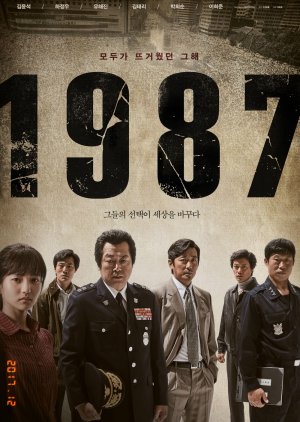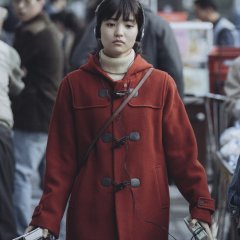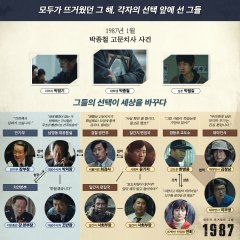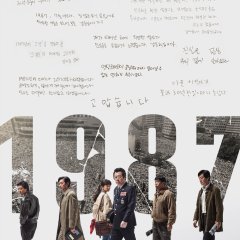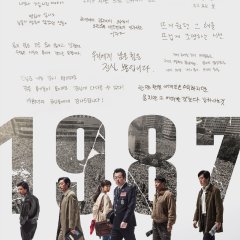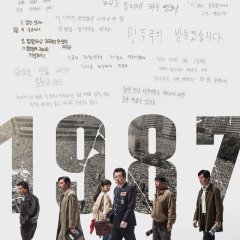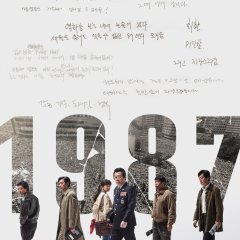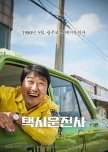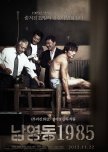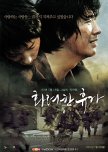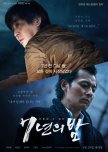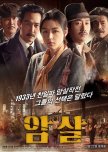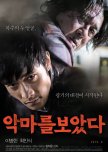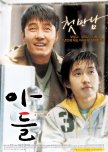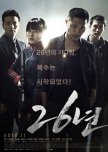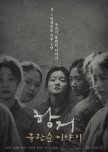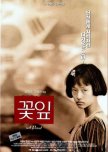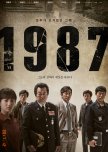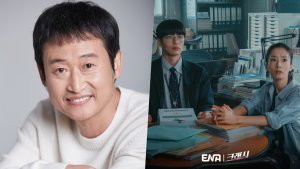 Yoo Seung Mok to join Lee Min Ki and Kwak Sun Young in the new K-drama "Crash"
Yoo Seung Mok to join Lee Min Ki and Kwak Sun Young in the new K-drama "Crash" The story of the public authorities and the people trying to reveal the truth to conceal the murder of Park Jong Cheol, who became the fuse of democratization in the background of 1987. Edit Translation
- English
- magyar / magyar nyelv
- dansk
- Norsk
- Native Title: 1987
- Also Known As: 1987 , 1987: Quando Chega o Dia
- Director: Jang Joon Hwan
- Screenwriter: Kim Kyung Chan
- Genres: Thriller, Drama, Political
Where to Watch 1987: When the Day Comes
Cast & Credits
- Kim Yoon Seok Main Role
- Ha Jung Woo Main Role
- Yoo Hai Jin Main Role
- Kim Tae Ri Main Role
- Park Hee Soon Main Role
- Lee Hee Joon Main Role
Reviews

This review may contain spoilers
Quiet resistance becomes power—ordinary lives spark change in this gripping historical drama
South Korea, 1987: a country under the control of an authoritarian regime, where freedom of expression is suppressed and political activists are brutally persecuted. Amidst this repressive atmosphere unfolds the KMovie “1987: When the Day Comes”—a political thriller that not only illuminates the events surrounding the death of student activist Park Jong-chul, but also showcases the collective power of a society rising up against injustice.Director Jang Joon-hwan weaves a dense web of dramatic force, historical accuracy, and emotional depth—creating far more than just a political drama. He delivers a silent outcry for democracy, civic courage, and collective remembrance. The story is staged like a relay race: the narrative jumps between journalists, prosecutors, students, and prison guards, showing how many small steps ultimately lead to a great change. The film for me is not only a cinematic masterpiece but also an emotional appeal to conscience.
Rather than following a classic hero, the film presents a mosaic of individuals who make great change possible through small decisions. Camera work and editing are precise, almost documentary-like, yet never lose sight of emotional resonance. Especially impressive is how the screenplay transforms seemingly incidental encounters—such as between a prison guard and his niece—into milestones of a historic awakening.
Instead of drawing a clear moral line, the film presents ambivalence: journalists who walk a tightrope; a prison guard yielding to his conscience; a student who moves from cautious skepticism to resolute conviction; an official who refuses to look away at a decisive moment. Their actions are subtle, their words sometimes hesitant—and it is precisely this that creates a realism far beyond mere dramatic staging. It is the “little” people—the inconspicuous, sometimes nameless figures—who give the film its depth and authenticity.
These figures serve as moral compasses in a system that punishes any deviation. Their choices are not loud heroic deeds, but quiet acts of resistance that pave the way for change. While the great battles move the audience, it is these moments that linger—because they show how democracy begins in everyday life: through the courage to embrace humanity.
In this, “1987” achieves something rare: the film not only celebrates the victors of history, but honors those who stood in the shadows—without whose actions no light would have illuminated the dark corridors of the past.
-----------------------------------------------------------------------
SIDENOTE:
THE FRAGILE SEEDLING OF ‘DEMOCRACY’ and SOUTH KOREA IN 1987
South Korea in 1987 stood at a crossroads: The military leadership under Chun Doo-hwan clung to power, while the populace—above all, students and intellectuals—had been rising up with growing courage for years. The brutal torture and murder of student Park Jong-chul became a turning point. The subsequent response, the June Uprising, initiated the transition to democracy.
South Korea's path to democracy is remarkable for its dynamism and symbolic power – especially in the pivotal role played by ordinary people. While other countries liberalized slowly, the Korean people fought for their freedoms against a heavily armed and determined regime. The role of students, church networks, and the media was central—an example of how civil society can become the driving force for change.
The film does not depict these developments as a triumphant victory march, but as a difficult, fragile path on which many risked their safety, freedom, and even their lives. This realism makes the story tangible—and relevant.
What makes “1987” so explosive, too, is its current relevance. The film is not a nostalgic project—it flickers as a warning signal in times when democracies around the world are under pressure. Even today, we witness how the erosion of democratic institutions often happens gradually: through indifference, disinformation, and complacency.
How easily we forget that democracy is not a given—that it must be actively lived and defended. “1987” reminds us that you don’t need a “big moment” to take a stand—it is everyday courage that counts.
“1987: When the Day Comes” thus for me is more than a moving film—it is an invitation not only to discover South Korea’s past, but also to question our own present. What are we doing today?
Was this review helpful to you?

What is TRUE PATRIOTISM?
The influence the PRESS wields exhibits the tenacity that TRUTH and JUSTICE might TRIUMPH in a civil society. The film reminded me of The Pentagon Papers (2003) about the U.S. involvement in the Vietnam War. Seismic social changes do not come about immediately as negative sentiment must first build throughout the years, and citizens grow agitated by their public officials.Brief History
Korean History 101, Democracy embedded itself in South Korea culture years before Park Chung-hee assassination occurred on October 26, 1979, rejuvenating the democratic movements in South Korea, silenced initially under Park's Dictatorship regime. May 18, 1980, Gwangju Uprising was the beginning of a more unpopular oppressive military regime under Chun Doo-hwan leading up to the June 1987 Democratic Movement changing the fate of a Nation's political landscape.
---------------------------------------------------------------------------------------------------------------------
Director Jang Joon Hwan's documentary touch paints the perfect image of South Korea, the repression of civil discord within the year 1987. The viewer concentrates on watching the film conveying a story with a palpable tempo, to pull it off with suspense, to appeal to emotion, and to entertain. It is a film that wept tears of human horror, moved by the courage of those who pursue the truth. Most people will wallow in this film, but few people will rebuff it and say it is biased.
With the word "Communist" by a single word, the whole state persecutes ordinary people. On the contrary, the same persecution was happening in a socialist country. When a nation uses its "enemies" to inflame its people, it is better to be careful before the persecution. Jang Joon Hwan's micromanaged the word "Conscience" introspectively. What is TRUE PATRIOTISM?
In my book, Kim Yoon Seok pitches in an Oscar-worthy performance with his cold-eyed gaze. In the first encounter with KYS's character, the audience perceives the warped and distorted view of PATRIOTISM through his mindset. Ha Jung Woo's role may not have had the screentime he merited, but what an energetic rendition of a Prosecutor's unwillingness to bend to his Superiors wishes.
Kim Tae Ri depicting a university student swallowed up in the Democratic Revolution contributed to the turbulent climate of the period. Lee Hee Joon's portrayal of Reporter Yoon furnishes tenacious energy to his purpose ductile like iron. It is such a story that the audience thinks of the nameless predecessors who fought to protect the rights of the people who are today, as most actors depict fictional characters. All the actors do a marvelous job except I would have liked to see more from the people's side. The one complaint I have about this film the music and shouting sometimes drown out the dialogue between the actors. Other than that, unheralded film.
South Korea attained what the 1989 Tiananmen Square protesters could not Democracy with free and fair Presidential Elections not favored for one party or one candidate. Corruption will exist in politics for eternity, but the right to choose your elected officials' and hold them accountable is a blessing. The tyranny of the regime silently; it becomes a problematic situation.
I think back on the 2016-2017 Candlelight Revolution Movement against the unpopular President Park Geun-Hye (2013-2017), the daughter of dictator Park Chung-hee, eventually impeached for the corruption of bribery sentenced to 25 years in prison. Democratic values have wavered, but Standing Up for Truth and Justice has not fluctuated since 1987.
Final Rating: 8.59/10
Acting: 9.60/10
Story: 8.98/10
Rewatch Value:
I have watched this film three times, so it is rewatchable for anyone able to stomach the subject matter - based on True events.
Was this review helpful to you?

